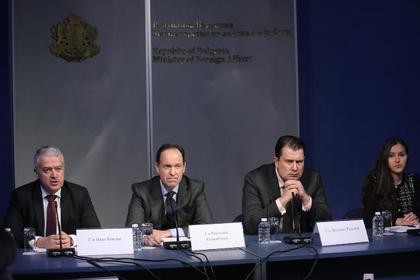Deputy Minister Kostadin Kodzhabashev presented an update on the work of the MFA at a media briefing
14 February 2023 News
Deputy Minister of Foreign Affairs and Spokesman Kostadin Kodzhabashev presented an update on the work of the MFA at a regular media briefing held today at the MFA building. The briefing was also attended by Ivan Kondov and Kalin Anastasov, the Chairman and Vice-Chairman of the MFA Working Group on Elections, as well as Zhelyazko Radukov, State Expert from the South-East Europe Directorate.
Among the topics presented were the agenda of the meetings of the General Affairs Council and of the Heads of State and Government of the member states of the European Union, which took place in Brussels last week, as well as the first meeting for 2023 of the Inter-Ministerial Coordination Mechanism for Bulgaria's accession to the Organisation for Economic Cooperation and Development.
Emphasis was also put on the telephone conversation between Minister Nikolay Milkov and his Israeli counterpart Eli Cohen at the end of last week. Deputy Minister Kodzhabashev also informed about the upcoming visit of the Bulgarian Minister of Foreign Affairs to The Hague, the Netherlands, to participate in a high-level meeting on "Responsible application of artificial intelligence in the military sphere". In the framework of the event, Minister Milkov is scheduled to meet with the Minister of Foreign Affairs of the Netherlands, Wopke Hoekstra, to discuss Bulgaria's accession to the Schengen area.
In his speech, the MFA spokesperson gave an overview of the work done by Bulgaria in relation to the earthquake in Türkiye and Syria. It was pointed out that no new information about Bulgarian citizens killed or injured has been received so far. Deputy Minister Kodzhabashev noted that a permanent presence of diplomats from our Embassy was ensured in the disaster area to assist the Bulgarian rescue teams. About 130 Bulgarians are continuing rescue operations in the affected areas. The Consular Office of the Bulgarian Embassy in Ankara has set up an emergency reception of applications for travel documents of Bulgarian citizens wishing to be evacuated to our country.
Kostadin Kodzhabashev also reported on a Bulgarian family in Latakia, Syria, which was affected by the earthquake in Türkiye. According to him, it is a mother with a one-year-old child whose home was destroyed. According to the Bulgarian diplomatic mission in Syria, the child's father is currently in Germany. The Bulgarian embassy in Damascus has established contact with the injured family. "At the moment they do not want humanitarian assistance from the Bulgarian state," Deputy Minister Kodzhabashev said, stressing that the embassy has expressed readiness for consular protection and assistance.
Asked to comment on Bulgaria's readiness to send humanitarian aid to Syria, the deputy foreign minister said that permission was still pending from the EU's European Civil Protection Mechanism, which was in constant contact with representatives of the World Food Programme in Beirut. It was noted that Bulgaria is one of the nine EU countries that have offered to send humanitarian aid to Syria.
The relations between Bulgaria and the Republic of North Macedonia were also in the focus of the briefing. It was pointed out that by the end of the month Sofia and Skopje will hold consultations on consular issues that our country continues to face with regard to North Macedonia. At the meeting, our country will raise all open issues on the subject.
The ministry continues to receive signals about the attitude of the border authorities of our south-western neighbour towards Bulgarians on 4 February, when dozens of our compatriots were not allowed in North Macedonia for the commemoration of the anniversary of the birth of Gotse Delchev, and some of them were arrested and beaten. "The violation of the rights of Bulgarians, regardless of whether they are Bulgarian citizens or citizens of another country, is absolutely unacceptable and we will use all available opportunities, all our resources to oppose such actions, which bear all the signs of a systematic and purposeful policy," Kostadin Kodzhabashev said.
It was also pointed out that politicians in North Macedonia are abusing the thesis that Sofia is raising the issue of the rights of the Macedonian Bulgarians because of the upcoming elections. "This argument does not correspond to the truth and sounds more like an excuse for Skopje's lack of will to start implementing long-standing commitments soon. Our concern for the Bulgarians in the RNM will not disappear after the next elections, because the problem of their rights will not disappear," the MFA spokesperson stressed. According to him, the sooner the authorities in the neighbouring country acknowledge the existence of this problem and take effective steps to resolve it, the sooner Skopje will advance on its European path.
Ivan Kondov, Chairman of the Working Group "Elections", presented details on the organization of the upcoming parliamentary elections abroad on April 2 this year. According to him, 800 polling stations are expected to be opened abroad, as 34 countries have already given permission for the elections to be held on their territory. "BGN 8,852,000 has been allocated for the elections abroad. The preparation, the plan-account and in general the whole organisation is based on our estimates for about 800 polling stations. This implies the appointment of about 4,500 people as members of precinct electoral commissions," Ivan Kondov further said.
Emphasis was put on the need to send civil servants to every polling station abroad. About 600 civil servants are expected to be posted from the country. It was pointed out that so far the number of those posted abroad for the conduct of elections has been around 380-390.
The Ministry of Foreign Affairs is calling on Bulgarians abroad to pre-register electronically if they wish to exercise their vote in the elections on 2 April. "Pre-registration means that these people are automatically entered on the lists and then the work of the polling station commissions is easier," Ivan Kondov said.
